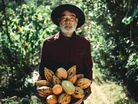Scientists Create Sugar-Free, Sustainable Chocolate

Scientists have developed a method of making chocolate that uses the entire cocoa fruit, including the pulp, juice and husk, and that they claim results in a product that is both flavourful and sustainable.
Food scientists at Zurich's prestigious Federal Institute of Technology (FIT) in Switzerland have succeeded in incorporating the natural sweetness of the fruit's pulp and juice and eliminated the need for added sugar – a significant contributor to health concerns.
Traditionally, chocolate producers have discarded all parts of the the cocoa fruit aside from the the beans. The BBC explains this process as being like "picking up a nice juicy apple but instead of biting into it you keep the seeds and throw the rest away".
But by using the entire fruit, the new approach offers a more sustainable and efficient way to produce chocolate. The key to the new chocolate lies in the fruit's sweet juice, which is distilled to create a concentrated syrup. This is then combined with the cocoa pulp and husk to form a gel that can be used in place of traditional chocolate ingredients.
The resulting chocolate not only eliminates the need for sugar but also offers a unique and flavourful experience, the scientists say.
The standard chocolate production process has often been criticised for its environmental impact and reliance on child labour. The revolutionary approach of the Swiss team of scientists could help address these long standing issues.
The future of chocolate: a sustainable solution
The breakthrough builds on a long history of Swiss innovation in the chocolate industry.
In the 19th century, Rudolf Lindt, a member of the renowned Lindt chocolate family, accidentally invented the conching process, which involves rolling warm cocoa mass to create a smooth and creamy texture.
This technique remains a cornerstone of chocolate production today.
Now, industry watchers will be looking closely to see if Swiss chocolate manufacturers such as Cailler, Lindt & Sprüngli and Frey use the FIT innovation to adapt their manufacturing processes to launch new product lines and go after improved environmental credentials.
The current method often results in the disposal of the majority of the cocoa fruit, leading to waste and environmental inefficiency.
A sustainable future: benefits for farmers and the planet
The new chocolate production method offers several benefits beyond its environmental implications
By utilising the entire cocoa fruit, farmers can diversify their income and reduce their reliance on the fluctuating prices of cocoa beans.
Additionally, the production of chocolate closer to the source of cocoa can create jobs and stimulate local economies.
The development of sugar-free chocolate using the entire cocoa fruit marks a significant step towards a more sustainable and ethical chocolate industry.
As consumers become increasingly aware of the environmental and social impacts of their food choices, there is a growing demand for products that are both delicious and responsible.
Anian Schreiber, Co-founder of KOA, a Swiss start-up working in sustainable cocoa growing that partnered in this project, believes using the entire cocoa fruit could solve many of the cocoa industry’s problems, from the rising price of cocoa beans to poverty among cocoa farmers.
He says: "Instead of fighting over who gets how much of the cake, you make the cake bigger and make everybody benefit.
"The farmers get significantly extra income through utilising cocoa pulp, but also the important industrial processing is happening in the country of origin. Creating jobs, creating value that can be distributed in the country of origin."
--------------
Make sure you check out the latest news at Food Digital, a BizClik brand




